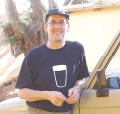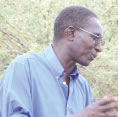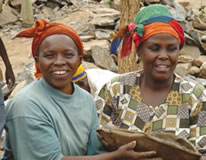A truly Excellent Development in Africa
A Local Self-help Charity has transformed the lives of thousands
| Related Links |
|
Excellent Development for Local Charity
Visit their website at: www.excellentdevelopment.com Receive a free weekly newsletter from BrentfordTW8.com
|
Far removed from the idyllic holiday brochure images of sun-drenched national parks and glamorous safari excursions is the harsh reality that is anything but glamorous for thousands of people in Africa. Most of us have at some time pledged cash donations to the latest drought fund highlighted by the media, but for one Lancashire schoolboy back in 1985, this wasn�t enough.
Displaying an astonishing maturity and clarity of vision, Simon set up a subsidiary charity called Harambee �85 (which means �pulling together�) through a local Venture Scout Unit, and then took a year out to put his ideas into action and raise enough cash to make his vision a reality.
 Simon
Maddrell (pictured right) was taking his A Levels at the time, but � even
before Live Aid � he couldn�t ignore the urge to do something practical
to help alleviate the serious shortage of water in Africa.
Simon
Maddrell (pictured right) was taking his A Levels at the time, but � even
before Live Aid � he couldn�t ignore the urge to do something practical
to help alleviate the serious shortage of water in Africa.
Water is a vital but scarce commodity in the country�s semi-arid areas. The rainfall is erratic and the rate of evaporation is high.
One in three rainy seasons fails to supply enough water to sustain the population and there are only a few natural water sources, such as rivers and springs. Communities often suffer food shortages due to the lack of rain and women and children go without.
A meeting of minds
 In
England, Simon was introduced to Joshua Silu Mukusya (pictured left),
from the Machakos District of Kenya. Their backgrounds couldn�t have been
more different, but it was a meeting of minds. If the rainwater could
be stored, they reasoned, it could be used during the dry season to enable
farmers to increase food production. Small scale dams, built in seasonal
riverbeds, could potentially have a dramatic effect on the environment
and the availability of water during the drought periods. Together, Simon
and Joshua hatched a plan to build dams and water tanks in that semi-arid
part of Africa.
In
England, Simon was introduced to Joshua Silu Mukusya (pictured left),
from the Machakos District of Kenya. Their backgrounds couldn�t have been
more different, but it was a meeting of minds. If the rainwater could
be stored, they reasoned, it could be used during the dry season to enable
farmers to increase food production. Small scale dams, built in seasonal
riverbeds, could potentially have a dramatic effect on the environment
and the availability of water during the drought periods. Together, Simon
and Joshua hatched a plan to build dams and water tanks in that semi-arid
part of Africa.
Within three years, 75 families were committed to the work of UDP, whose motto, �Without Vision We Perish�, has since encouraged thousands of people to improve their own lives and those of their communities.
�In the early 1970s, I discovered these very small barrages in the rivers that had been put there by the British government. I noticed how much these barrages changed the area where they were put � they slowed soil erosion and there was moisture around when other places were dry. So I started to think that, if they were bigger, they could hold water and benefit the community even more,� says Joshua.
Others agreed, and in 1978, the Kenyan Ministry of Agriculture financed him to build his first dam.
�I designed the dams just from my need to create a barrier in the river. I got a lot of trouble from water engineers who didn�t think the structures were useful,� Joshua remembers. �We have built 115 dams without a problem. However, we have learned many things since. For example, we developed a piping system to collect sand filtered water that is cleaner than any other source in the area.�
Joshua�s story
Joshua Mukusya was born in 1948 and studied agriculture in Eastern Kenya. After working in different parts of the industry for several years, he returned to his village of Utooni to look after his family following the death of his father. While he was still at primary school, it had been Joshua�s task to collect water for the family very early in the morning and again when school had finished in the afternoon. The closest spring was 4 km away, although during the frequent droughts the nearest source was twice that distance. �When I was 20 years-old, I promised my parents that I would do something about water, because I didn�t want my own children to be walking all that way every day,� Joshua recalls.
Because the
riverbeds and springs start to dry up very quickly after the rains, it
is normal for people and animals to have to walk up to 10 km in search
of water. In some areas they have to walk 30 km during severe droughts.
Aside from the hardship and drudgery of having to collect and carry water
so far on foot, the water is often dug out of riverbeds and it can be
unsanitary. Water scarcity and hygiene issues are a major threat to the
health and welfare of local people, especially the youngest and the very
old. It didn�t take Joshua long to keep the vow he�d made to his parents.
In 1978, he set up the Utooni Development Project (UDP) with the help
of six sympathetic families, who believed in his ideas for self-help.
Transforming lives & the environment
Back in the UK, Simon Maddrell and his band of Scouts had spent six busy months raising £32,500 towards their own water conservation project. Coincidentally, they set off for Kenya the morning after Bob Geldof�s historic Live Aid concert was beamed around the world.
With Joshua Mukusya�s know-how and their own enthusiasm, the troupe returned home triumphant four weeks later, having helped construct two dams, six barrages and an incredible 70 water tanks, which collected rainwater from corrugated iron roofs. Their endeavours brought them to the attention of Radio One DJ Peter Powell and his producer Chris Lycett, who spent a week with the community in Kenya and dedicated the whole of their weekend radio show to the project.
This was just the start of Simon�s relationship with the people of the area. It has so far lasted nearly 20 years, during which time the project has funded and built 8,500 water tanks and 120 subsurface dams to virtually transform the environment and enhance the lives of the indigenous communities.
The dams are built using local materials and local artisans working at carefully selected points in the riverbeds. Local people collect all the sand, stones and water required for the construction. Up to 150 villagers join together to construct each dam over several days, building them up to a height of 12�18 ft (4�7 m).
The dams store water beneath the sand which collects behind the dam, and water is then extracted from a pipe built into the wall of the dam. This helps to reduce soil erosion and maintain the level of the water table around the dam site. It also makes the dams perfect sites for tree nurseries.
While this solution cannot guarantee to protect trees or people and livestock from all climatic eventualities, it does without question significantly improve water supplies in the area.
From water to forests
During a trip to Kenya in 1997, Simon and Joshua discussed the priorities of the community after almost 20 years of development work in the area. While water is always a priority in semi-arid areas, over the last 30 years population growth had contributed towards massive deforestation, which exacerbates the problems of the semi-arid environment. Joshua felt that it was time to couple the dam building with a tree planting programme, which would create long-term benefits to the local environment and for the people who lived in the region.
After taking voluntary redundancy from his full time job in January 2001, Simon Maddrell gave Joshua the funds to plant some trees on his farm to test a number of species and demonstrate the tree planting idea to fellow project members.
In May the following year, Simon founded Excellent Development Ltd. That winter they achieved UK Registered Charity Status, followed by the launch of their website.
By August 2002, the impact of these small scale conservation activities was very evident. Even without a formal tree planting programme there had been a vast improvement in vegetation, with water being conserved in the Manzaa valley throughout most of the dry season. �We have seen the difference that it has made to the Manzaa area. It was a quarantined region in the late 1950s and now there are many trees that have just grown without any help. It has been transformed into a valley that can sustain vegetable nurseries, grow fruit trees and attract water birds during droughts,� reports Joshua Mukusya. �I love the dams more than anything, because they came out of nowhere. We have created our own springs for our own people.�
Using the Internet to save the Environment
One unique aspect of Excellent Development is that its public fundraising and administration processes are run solely on the Internet and email to reduce paper and energy usage. Not only does this keep costs down, it also helps the charity to operate in sympathy with its environmental aims.
Excellent Development takes a holistic approach to its overseas activities, focusing on both development and conservation and ensuring that it helps people meet their needs in sympathy with their environment.
�Since we started working together in 1985, we do what the people want rather than what we feel is necessary. We don�t go to groups with set goals; we hear what they want and understand their thinking so that we can help them move towards their goals,� says Joshua, who is now the charity�s Eastern Kenya Project Consultant.
Simon Maddrell, the British man whose vision has transformed thousands of lives in Africa, is full of praise for his colleague, describing them as �the heart and soul� of the organisation. However, Simon also received some well-deserved recognition in 2003, when he was nominated for the prestigious Beacon Prize for his philanthropic endeavours. �In an almost impossibly difficult process, with many hundreds of outstanding nominations, Simon�s achievements stood out as exceptional,� comments Emily Stoner, Chief Executive of Beacon, which recognises individuals who are an inspiration to others in the way that they devote their time and/or money to good causes.
More Excellent initiatives
The valuable work started by Simon, Joshua and Excellent Development continues, relying on donations from supporters and fundraisers for financial and practical help. The charity�s mission by 2010 is to plant two million trees, in partnership with disadvantaged communities, supported by an infrastructure of 200 small scale dams and water tanks in Africa.
To this end, Excellent Development has devised and patented a number of innovative brands to enable those who wish to support the charity to help fund future work. Initiatives include:
� Purchasing trees, which will compensate for the CO2 created by the average UK resident
(find out how at www.TreeDuty.com )
� Pledging money to plant a tree a month
� Helping to fund a dam-building programme
All donations go direct to the project.
March 17, 2004
